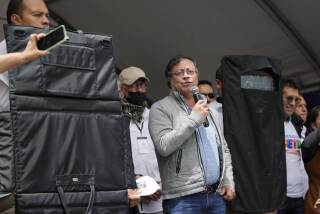Colombians Back Peace Referendum
- Share via
BOGOTA, Colombia — While a guerrilla-imposed election boycott kept many from the polls in rural areas, election officials said Monday that city dwellers had voted overwhelmingly for a peace referendum to end the nations’s four-decade-long civil war.
Half the country’s registered voters--or 10 million people--cast a special green ballot for peace in local elections Sunday, according to results released Monday. The result has encouraged local leaders to pursue their own talks with the rebels, filling the gap left by the government’s inability to even begin negotiations.
“The guerrillas are very sensitive to public opinion, and we hope this will pressure them to enter into discussions,” said Diego Turbay, a member of the leading political family in the Amazon state of Caqueta. Before the election, Turbay tried unsuccessfully to negotiate democratic guarantees with the Revolutionary Armed Forces of Colombia, this nation’s largest guerrilla group, known by the Spanish initials FARC.
“We hope we now will be able to meet with them to discuss cease-fires, human rights, the surrender of arms and other vital issues,” he said.
For voters in Colombia, where political killings and kidnappings have become common, the call to vote in the symbolic peace referendum far outweighed appeals from candidates for governor or mayor.
While the mayors of several towns were elected with a few dozen votes, the referendum drew huge numbers demanding an end to the war between about 15,000 Marxist guerrillas and Colombia’s 200,000-strong armed forces.
The outpouring of support is likely to strengthen the position of the Roman Catholic Church and of local officials who are trying to negotiate regional peace agreements with Colombia’s two main guerrilla groups, analysts say.
It also bolsters those politicians trying to reach an understanding with guerrilla commanders in the states of Tolima, Narino, North Santander, Caqueta and Putumayo, where some of the heaviest fighting has occurred.
“The guerrillas will be forced to accept that the war has to be accompanied by policies and concrete proposals,” said Antonio Navarro Wolff, the mayor of Pasto, in the southern state of Narino. Guerrillas have carried out dozens of political kidnappings there.
“I think [the peace referendum] could be an incentive for them to discuss the important issues,” he said.
The FARC, which has increased its troop strength by 35% in the last five years, has shown little willingness to negotiate with the scandal-plagued government of President Ernesto Samper.
*
For the moment, the peace referendum appears to have handed the government a strategic victory. When the rebels halted transportation, bombed party headquarters and kidnapped dozens of candidates, more than 2,000 political hopefuls resigned in fear. But the voters have overwhelmingly signaled that they are fed up with the war and have faith in the democratic process.
“The guerrillas thought they could impede elections, show overwhelming strength and win ever greater popularity in their regions of influence,” said one source close to the guerrilla leadership. “But the strategy boomeranged.”
More to Read
Sign up for Essential California
The most important California stories and recommendations in your inbox every morning.
You may occasionally receive promotional content from the Los Angeles Times.













